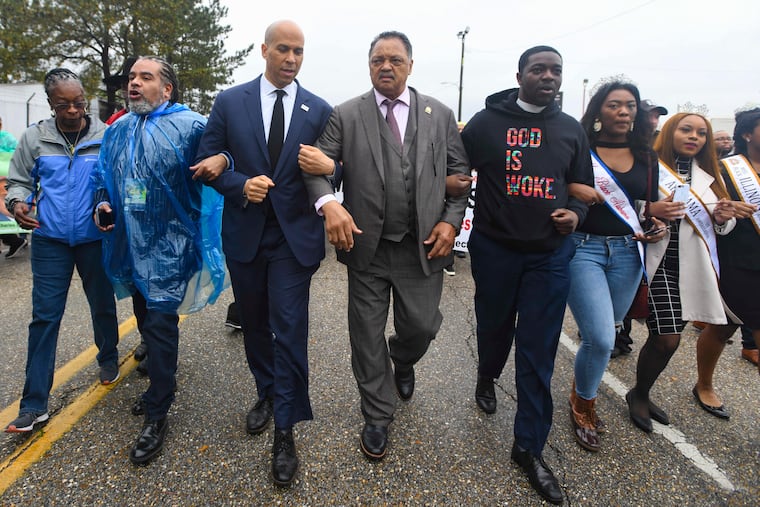Note to 2020 candidates: Showing up for today’s black Americans more important than symbolic Selma marches | Solomon Jones
Rather than posing for a photo op in Selma, I want to see our politicians fight for civil rights right now.

If any of us doubted that history repeats itself, we had only to watch Democratic presidential contenders gather in Selma, Ala., this week to commemorate the 1965 march known as Bloody Sunday.
The original march, in which Alabama state police brutally beat protesters as they demonstrated for black voting rights on Selma’s Edmund Pettus Bridge, was a televised spectacle that showed America the viciousness of Jim Crow.
On Sunday, Democratic presidential hopefuls Bernie Sanders and Cory Booker, along with fellow Sen. Sherrod Brown, who is also weighing a presidential run, crossed that same bridge, as did Democratic nominee Hillary Clinton, civil rights leader Jesse Jackson, and dozens of others. It was a reminder that Democrats, led by President Lyndon B. Johnson, pushed the Voting Rights Act through Congress after 17 people were injured in the violence at Selma. It was a reminder meant to show that Democrats still stand with black people.
To be sure, it is a strong message, but, in many ways, it rings hollow, because the conditions black people faced during the civil rights movement are making a comeback today. For those of us too young to remember the victories that came with the sacrifices of men such as Rep. John Lewis, who was on the bridge that day, 2019 might as well be 1965.
Even as I was writing this column, I watched California Attorney General Xavier Becerra, a Democrat, announce that no charges would be filed against two Sacramento police officers who shot and killed Stephon Clark, an unarmed black man, in his grandmother’s backyard.
Becerra told reporters that an 11-month investigation found that Clark did not obey officers’ commands, that Clark had broken a neighbor’s sliding glass door, and that Clark had advanced to within 16 feet of the officers. For that, the officers unleashed a hail of 20 bullets. Clark was hit eight times, with six of the bullets striking him in the back.
Police shootings of unarmed black men such as Clark are not new. Neither is the fact that officers are rarely charged in such incidents. This phenomenon is but one reason why 2019 might as well be 1965.
Just as Clark’s shooting death at the hands of police has gone unpunished, a police shooting just a few weeks before the 1965 march in Selma initially went unpunished, too.
On Feb. 18, 1965, in Marion, Ala., just 27 miles from Selma, a peaceful march was disrupted when state troopers attacked demonstrators. One of those protesters, Jimmie Lee Jackson, ran into a nearby restaurant, where state police followed and began beating restaurant patrons. Trooper James Bonard Fowler shot Jackson, who tried to shield his mother from the blows. Jackson later died from his injuries.
In 1965, a grand jury declined to indict Fowler in Jackson’s shooting death, thus allowing Fowler to shoot and kill another black man a year later. It wasn’t until 2010, after Fowler confessed his crime to a journalist and a black district attorney won an indictment, that Fowler was found guilty of manslaughter and served a paltry six months in prison.
Not much has changed since then. Dangerous cops who unjustly shoot or kill African Americans are still allowed to remain on the force to continue doing harm. Former Philadelphia Police Officer Ryan Pownall, who shot Carnell Williams-Carney in the back in 2010, leaving him paralyzed, remained on the force until he shot David Jones in the back, killing him.
Black voting rights are still under attack, as well. In 2013, after years of trying to overturn the Voting Rights Act, conservative Republicans won a victory in Shelby v. Holder, a Supreme Court case that effectively gutted the law that rose out of the 1965 protests in Selma.
Within hours of the Shelby decision, Texas implemented a new voter ID law — although such laws have been shown to disproportionately suppress the votes of blacks and Latinos who are less likely to have the kind of ID such laws require.
Georgia closed polling places in black communities and purged thousands of people from its voter rolls.
North Carolina passed a series of laws that a federal appeals court said targeted blacks with surgical precision.
Though the laws in North Carolina and Texas were challenged and watered down, the intent remains clear. Black and brown voters are under attack, just as they were in 1965.
That’s why, if presidential candidates truly want to address black issues, they must face the fact that we don’t need them to visit the site of past struggles. We need them to address what’s happening right now, because 2019, in many ways, looks just like 1965.
So rather than posing for a photo op in Selma, I want to see our politicians fight for civil rights right now. Go out to Sacramento and get justice for Stephon Clark. Go to Long Island and get justice for Eric Garner. Come to Philadelphia and get justice for Jeffrey Dennis.
Only then can we have serious conversations about supporting anyone for president, no matter which party they represent.
Solomon Jones is the author of 10 books. Listen to him weekdays from 10 a.m. to noon on Praise 107.9 HD2. Email him at sj@solomonjones.com. @solomonjones1